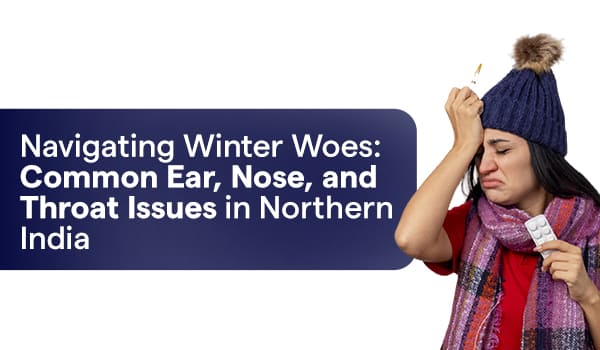
As a specialist from the best ENT specialist, I find it crucial to shed light on some common issues that individuals in Northern India may face during the winter months.
One of the most prevalent problems during winter is nasal congestion. The cold air tends to be dry, leading to the drying of the nasal passages. This, coupled with indoor heating systems, can result in irritation and congestion. Many individuals experience difficulty breathing through their noses, leading to mouth breathing, which can further exacerbate throat problems. To alleviate this, it is essential to stay hydrated by drinking plenty of water and using a humidifier to add moisture to the indoor air. Upper respiratory tract infections, such as the common cold and flu, are also more prevalent during the winter. These infections worsen when symptoms in individuals with pre-existing conditions like asthma cause coughing, wheezing, and shortness of breath. It is essential to be aware of these common ENT problems and seek appropriate medical care if experiencing any related symptoms.
Sore throats are another frequent complaint during the winter season. The cold and dry air can irritate the throat, making it more susceptible to infections. Additionally, viral infections, such as the common cold and flu, are more prevalent in colder months. To prevent throat discomfort, practicing good respiratory hygiene, like covering your mouth and nose when coughing or sneezing, can go a long way. Maintaining a balanced diet rich in vitamins and minerals also boosts the immune system, providing added protection against infections.
Ear aches and infections are not uncommon during winter, especially in children. The cooler temperatures may encourage the accumulation of moisture in the ears, creating a conducive environment for bacterial/fungal growth. Decreased hearing and ear blockage are commonly attributed to wax deposits but commonly and especially at this time of the ear can be a symptom of sudden loss of hearing and should not be misinterpreted so, as early treatment can be a game changer. Additionally, frequent nose blowing which is a common practice can be counterproductive and should be refrained from.
Another issue that often surfaces during winter is sinusitis. The sinuses, located in the forehead, cheeks, and behind the nose, can become inflamed and blocked, leading to headaches, facial pain, and difficulty breathing. To alleviate symptoms, maintaining proper nasal hygiene, using saline nasal sprays, and avoiding prolonged exposure to cold air can be beneficial. Avoid using over-the-counter decongestant nose drops which have plenty of side effects when used over longer periods causing refractory and rebound nasal congestion.
While it's crucial to be aware of these common winter-related ear, nose, and throat issues, practicing good hygiene, such as frequent hand washing and avoiding touching your face, can help prevent the spread of germs/viruses and reduce the risk of catching a cold or flu. Lastly, avoiding irritants like smoke and strong perfumes is advisable, as they can worsen ENT problems by irritating the nasal passages and throat. Seeking professional medical advice is paramount if symptoms persist or worsen. An ENT specialist can provide a thorough examination and recommend appropriate treatments or preventive measures tailored to individual needs. If you have any concerns or questions regarding ENT problems or the current COVID-19 situation, book an appointment with Sir Ganga Ram Hospital, where you can find the necessary expertise and personalized care.